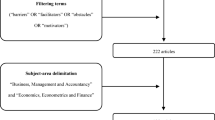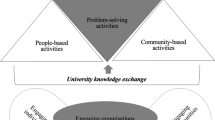Abstract
The paper considers the role of universities as actors in regional development, and the implications for approaches to knowledge, including knowledge construction. The new role for universities requires the production of knowledge, which relates to the needs of the region. Particular attention was given to the Agder region of Norway, and Agder University College.
Similar content being viewed by others
Notes
The actors are Sørlandets Kompetansefond, which have 100 mill. Euro, Cultiva that have 150 mill. Euro and Aust-Agder Kompetansefond with 50 mills. Euro. The return of equity is used to stimulate regional knowledge projects
The concept, codified knowledge is by no means a simple concept. What signs researcher use in codification can be value-loaded and have consequences for both the discussion of a phenomena and the conclusion of the discussion. The linguistic turn is one of the most important contributions to the knowledge concept discourse.
Polanyi (1966) is not consistent throughout the book. Somewhere he uses the concept tacit knowledge, see page 17 and 22.
The five levels are divided in: Novice, advanced beginner, competent, proficient and expert.
References
Asheim BT (1996) Industrial districts as “learning regions”: a condition for prosperity? Eur Plan Stud 4(4):379–400
Asheim BT (2001) Learning regions as development coalitions: partnership as governance in European workfare states? Concepts and Transformation. Int J Action Res Org Renewal 6(1):73–101
Asheim BT, Gertler M (2004) The geography of Innovation: regional innovation systems. In: Fagerberg J, Mowery D, Nelson R (eds) The Oxford handbook of innovation. Oxford University Press, Oxford
Berger PL, Luckmann T (1967) The Social construction of reality. Penguin, Harmondsworth
Brulin G (2001) The third task of Universities or How to Get Universities to Serve their Communities. In: Reason P, Bradbury H (eds) Handbook of action research. Sage, London, pp 440–446
Chatterton P, Goddard J (2000) The response of higher education institutions to regional needs. Eur J Educ 35(4):475–496
Collin F (2003) Konstruktivisme. Roskilde Universitetsforlag, Fredriksberg
Cooke P (2002) Knowledge Economics: clusters, learning and cooperative advantage. Routledge, London
Cooke P, Morgan K (1998) The associational economy: firms, regions and innovation. Oxford University Press, Oxford
Davies J (1998) The Public Role of the University: the dialogue of Universities with their Stakeholders: comparisons between different regions of Europe (CRE)
Dreyfus H, Dreyfus S (1988) Mind over Machine: the power of human intuition and expertise in the era of the computer. Free Press, New York
Florida R (1995) Toward the learning region. Futures 27:527–536
Flyvbjerg B (2001) Making social science matter. Why social inquiry fails and how it can succeed again. Cambridge University Press, Cambridge
Gibbons M, Limoges C, Nowotny H, Schwartzmann S, Scott P, Trow M (1994) The new production of knowledge – the dynamics of science and research in contemporary societies. Sage, London
Greenwood DJ, Levin M (1998) An introduction to action research social science for social change. Sage, Thousand Oaks
Gustavsen B (2003) New forms of knowledge production and the role of action research. Action Res 1(2):153–164
Johnsen HCG, Karlsen J (2004) Action Research in a Complex Context: the challenge of different kinds of Knowledge Construction. 3. Nationale Konferance: Metoder i Aksjonsforskning 4. og 5. November 2004, Ålborg Universitet
Levin M (2004) Knowledge and technology transfer. Can universities promote regional development. In: Burtscher C, Harding A, Laske S, Scott A (eds) Knowledge factories: Universities and territorial development in the global information age. Hampp, Munich
Lundvall B-Å (2002) The University in the learning economy. DRUID (Danish Research Unit for Industrial Dynamics), working paper no 02–06
Lundvall B-Å, Maskell P (2000) Nation states and economic development—from national systems of production to national systems of knowledge creation and learning. The Oxford handbook of economic geography. GL Clark, MP
Lundvall B-Å, Johnson B (1994) The learning economy. J Ind Stud 1:23–42
Maskell P, Malmberg A (1999) Localised learning and industrial competitiveness. Cambridge J Econ 23:167–186
Nonaka I, Takeuchi H (1995) The knowledge-creating company – How Japanese companies create the dynamics of innovation. Oxford University Press, New York, Oxford
Nowotny H, Scott P, Gibbons M (2001) Re-Thinking science, knowledge and the public in an age of Uncertainty. Polity Press, Cambridge
Pavitt K (2002) Knowledge about knowledge since Nelson and Winter: a mixed record. Electronic Working Paper Series Paper No. 83, Science Policy Research Unit, University of Sussex
Polanyi M (1966) The tacit dimension. Doubleday, New York
Polanyi M (1958) Personal knowledge: towards a post-critical philosophy. Routledge and Keegan Paul, London
Ryle G (1949) The concept of mind. The Chicago University Press, Chicago
Author information
Authors and Affiliations
Corresponding author
Rights and permissions
About this article
Cite this article
Karlsen, J. When regional development becomes an institutional responsibility for universities: The need for a discussion about knowledge construction in relation to universities’ third role. AI & Soc 19, 500–510 (2005). https://doi.org/10.1007/s00146-005-0330-9
Received:
Accepted:
Published:
Issue Date:
DOI: https://doi.org/10.1007/s00146-005-0330-9




